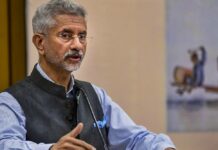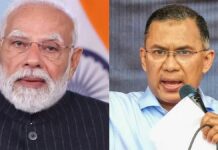X: @the_news_21
In a significant turn of events, all six candidates, including notable figures Ashok Chavan and Milind Deora, secured their positions in the Rajya Sabha unopposed, marking a notable moment in Maharashtra’s political landscape. This development underscores the shifting dynamics within the state’s political corridors, with key figures making strategic moves to align themselves with ruling parties.
The winners of these unopposed elections comprise a diverse mix of political affiliations, with representation from various parties. Among them are Chavan, Medha Kulkarni, and Dr. Ajit Gopchade from the BJP, Deora representing the Shinde Sena, Praful Patel from the Ajit Pawar-led NCP, and Chandrakant Handore from the Congress. Their uncontested victories can be attributed to the absence of competing candidates, leading to a straightforward election process.
The absence of opposition candidates resulted in the swift declaration of these leaders as winners, despite the scheduled election date of February 27. This outcome speaks to the political landscape’s intricacies and the strategic maneuvers employed by parties to secure their positions in the upper echelons of governance.
Milind Deora, who recently transitioned from the Congress to the Shinde-led Sena, expressed gratitude towards Chief Minister Eknath Shinde and other party leaders for his unopposed election. In a statement, Deora conveyed his commitment to working towards the development of Mumbai, Maharashtra, and India within the parliamentary framework.
Deora’s defection from the Congress last month, accompanied by nine corporators and a significant support base, marked a notable departure from his former political allegiance. Citing reasons such as the Congress’s approach to governance and leadership style, Deora’s move underscores the evolving dynamics within Maharashtra’s political spectrum.
The Election Commission of India’s announcement of elections for 56 Rajya Sabha seats across 16 states, including six constituencies in Maharashtra, set the stage for these developments. The nomination process commenced on February 8, with candidates filing their nominations until February 15. Subsequent scrutiny of applications and withdrawal of nominations culminated in the unopposed victories declared on February 21.
The impending vacancies in the Rajya Sabha, with the terms of MPs from various parties set to expire on April 2, underscored the significance of these elections. The transition of power within the upper house reflects the broader political landscape’s dynamics, wherein parties strategically position themselves for optimal representation and influence.
As Maharashtra gears up for the upcoming Rajya Sabha elections on February 27, the unopposed victories of these political heavyweights signal a pivotal moment in the state’s political narrative. Their presence in the upper house is poised to shape legislative discourse and policy decisions, underscoring the enduring influence of strategic political maneuvers in India’s democratic framework.








how to buy cheap clomid no prescription clomid pills at dischem price where can i buy clomid where can i buy clomid clomid pills can i order cheap clomiphene without insurance cheap clomid pills
This is the gentle of literature I truly appreciate.
More articles like this would frame the blogosphere richer.
zithromax 500mg price – ciplox price brand metronidazole 200mg
rybelsus 14 mg pill – buy generic rybelsus order cyproheptadine online
buy motilium medication – order flexeril online cheap cyclobenzaprine 15mg pill
purchase nexium pills – nexiumtous purchase nexium
meloxicam cost – https://moboxsin.com/ where to buy mobic without a prescription
buy generic ed pills online – fastedtotake ed pills that really work
purchase amoxil sale – buy amoxicillin sale order amoxicillin sale
buy diflucan for sale – fluconazole brand buy generic diflucan 100mg
cenforce 100mg over the counter – cenforce 100mg ca order cenforce for sale
cialis how to use – https://strongtadafl.com/ order cialis soft tabs
viagra 50 milligrams – https://strongvpls.com/ how can i buy cheap viagra
I couldn’t hold back commenting. Profoundly written! este sitio
More posts like this would add up to the online elbow-room more useful. gabapentin 100mg for sale
More posts like this would persuade the online elbow-room more useful. https://ursxdol.com/augmentin-amoxiclav-pill/
Thanks on putting this up. It’s well done. https://prohnrg.com/product/omeprazole-20-mg/
This is the make of delivery I find helpful. https://aranitidine.com/fr/en_ligne_kamagra/
With thanks. Loads of conception! https://ondactone.com/simvastatin/
Thanks for putting this up. It’s evidently done.
https://proisotrepl.com/product/domperidone/
Greetings! Jolly useful par‘nesis within this article! It’s the scarcely changes which wish obtain the largest changes. Thanks a quantity in the direction of sharing! https://sportavesti.ru/forums/users/skdwg-2/
buy forxiga 10 mg generic – https://janozin.com/ forxiga cost
orlistat pills – this xenical 60mg oral
I am in fact enchant‚e ‘ to glance at this blog posts which consists of tons of profitable facts, thanks for providing such data. http://www.underworldralinwood.ca/forums/member.php?action=profile&uid=493490
You can shelter yourself and your ancestors by way of being cautious when buying panacea online. Some pharmacy websites control legally and put forward convenience, solitariness, sell for savings and safeguards for purchasing medicines. buy in TerbinaPharmacy https://terbinafines.com/product/aricept.html aricept
Greetings! Extremely gainful suggestion within this article! It’s the crumb changes which wish espy the largest changes. Thanks a lot towards sharing! aranitidine
I’ll certainly bring to read more.
Khám phá thế giới giải trí trực tuyến đỉnh cao tại MM88, nơi mang đến những trải nghiệm cá cược thể thao và casino sống động.
iwin – nền tảng game bài đổi thưởng uy tín, nơi bạn có thể thử vận may và tận hưởng nhiều tựa game hấp
Với giao diện mượt mà và ưu đãi hấp dẫn, MM88 là lựa chọn lý tưởng cho các tín đồ giải trí trực tuyến.
kuwin sở hữu kho game đa dạng từ slot đến trò chơi bài đổi thưởng, mang đến cho bạn những giây phút giải trí tuyệt vời.
casinos online usa real money
best online casino georgia
best online casino bonus